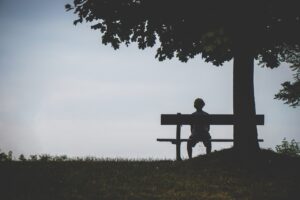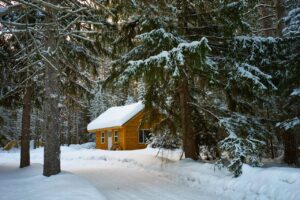“I love to be alone. I never found the companion that was so companionable as solitude.” – Henry David Thoreau
Here we find ourselves in lockdown with more freedom from the general distractions of life than ever before. For weeks, I found myself alone in my house. Nervous to go outside and having people be nervous around me. I struggled with the solitude at times. At other times I fully embraced it.
It’s led me to think about people who spend long periods of time in solitude. Last post I wrote about the monastic experience. Today I’m simply thinking about the last couple of months.
Things have been easing slowly. Life these days has more of a semblance of normalcy. The weather is improving and we’re finding ways to be more social. So what have I learned from my time spent in seclusion?
The path of solitude

For centuries, people have retreated from society as a way to understand themselves better and to heal themselves from traumas of the past.
It’s important to step away from it all once in a while. Take a break. Clear your head and get a new perspective on life.
By embracing seclusion, one gets a chance to get away from the busyness of life. It’s a chance to look inward and learn more about ourselves and how we operate. Break a few routines. Start new ones. Maybe even sever our connection with the external, material world and embrace simplicity for a while.
By stepping away, we give ourselves a chance to understand our lives a bit better. Understand ourselves. Maybe even make peace with ourselves.
I’ve always been fascinated with by men who’ve decided to escape from the pressures of society and choose a different path. I’ve read countless books about these kinds of journeys. Into the Wild, Solitude, and The Snow Leopard are ones that come to mind that I’d recommend.
An acquaintance of mine was recently featured in the New York Times. He’s spent the entire pandemic in silent meditation. In many ways I envy his last few months. Imagine never even knowing about COVID? Being free of the constant barrage of news and anxiety?
Walden

One of my all time favourite books is Walden, by Henry David Thoreau. If you haven’t read it, you should. It’s a classic.
Walden is essentially the journal of a man who decides to escape society for three years. And live in a forest in the woods.
It reads like a love letter to nature. It’s a catalyst for the modern mindfulness movement. And it’s one of the most quotable books around.
““I went to the woods because I wished to live deliberately, to front only the essential facts of life, and see if I could not learn what it had to teach, and not, when I came to die, discover that I had not lived.”
When I read Walden years ago, it was one of the books that really made me think about what really matters in life and the messaging we all receive. Messages that external power and wealth, and the accumulation of material goods are the real paths to happiness. Is that really true?
Here was a man who willingly decided to move in a direction completely opposite of that. To live a simple, modest life bereft of material goods.
And what he discovered was that the simpler things: gratitude, kindness, acceptance of oneself and an embrace of the present moment was all that really mattered to him.
“Love your life, poor as it is. You may perhaps have some pleasant, thrilling, glorious hours, even in a poorhouse. The setting sun is reflected from the windows of the almshouse as brightly as from the rich man’s abode; the snow melts before its door as early in the spring. I do not see but a quiet mind may live as contentedly there, and have as cheering thoughts, as in a palace.”
So I wonder to myself….can I also learn to appreciate more of the simpler things in life during this time?
Will my freedom from the previous distractions of life result in a newfound understanding?
Or should I keep looking for more things “to do”?
Making the best of the moment
I’ve done my best to try and embrace this period of seclusion. I’ve been working to be more okay with our current moment. Trying my best not to be upset because things are different than what I previously knew. Working on erasing the story that things aren’t supposed to be this way.
Yes, this has not been an easy time. But the idea that things are supposed to be a certain way (aka “normal”) isn’t true. There’s no supposed to. Just the way it is. “Normal” is just a story I tell myself and it’s often one we tell ourselves collectively. Normal is just what you’re used to. After a couple of months, this doesn’t feel as strange.
I’m also reminded that the resistance to what’s happening is often the biggest cause of my own distress. If I can work to accept the lockdown, and the social distancing protocols as my current reality, instead of fight against them, well, perhaps this time won’t be so bad.
I’ve been constantly asking myself how I can make the best of this? And while I haven’t come up with any concrete answers, I have been filling up this new time in different ways. More books. Home renovation projects (who knew that they could be fun?). Journaling. Delving deep into my meditation practice. And finding new and interesting ways to exercise.
Upon reflection, things haven’t been that bad.
I wonder if years from now, once the anxiety and pain of this moment passes, will people look back at this time with a little bit of reverence? Collectively, we slowed down. No traffic jams and cramped offices. No busy morning routines. Less distraction from outside. And more time for ourselves and our families.
When the hectic pace returns again. Will we miss the slowness?
Are you able to embrace the slowness of this time while caught in the midst of it?
Important lessons I’ve learned
In the spirit of Thoreau. I’ve been thinking about what I’ve learned from this forced slow down. What lessons can I take from this that will help me going forward? How should I live when business returns to usual?
1. Community is key
As much as I have tried to embrace the solitude, in the end, I’m a social animal. I admire Thoreau, but I’m not him.
It’s good to step away for times, but I need to be close to the core people in my life. It takes a crisis sometimes to find out who those people really are.
Who are the people that really have your back? When times are at their worst? Who will be with you through struggle? And how do I cultivate those relationships and keep them strong? Who would I protect and keep safe? How do I better keep connection with others?
2. Connection is more about time than space.
You don’t have to be in the same space as others to connect (zoom ain’t THAT bad) – connecting is more about making time for each other. Sharing. And getting into the deep places and vulnerable spots with other people you can trust.
3. I don’t need a lot of the things that I spend time doing.
Right now, I don’t really care that all of the restaurants, store and bars have been closed. Meh. It makes no difference on my happiness in the end and it costs me a lot of money. Why have I been spending so much time before in places that don’t have that much meaning for me?
4. The simplest pleasures matter most.
A walk out on a sunny day. A delicious meal. Time spent (virtually or not) with a loved one. When you strip it all away, I really don’t need all that much.
5. It’s important to find meaning in times of crisis.
We all need to find meaning to persevere. With meaning, you can endure a lot.
Ever read Viktor Frankl? This is the central thesis of Viktor Frankl’s –Man’s search for Meaning. In the health care world, it’s not too hard to find that meaning right now – it’s directly in our faces as we deal with the victims of this pandemic. But as things cool down, don’t forget about how important your job is. If you’re not in medicine, there can be meaning found in every day life. Spending time with your loved ones. Listening to your friends. Helping a neighbour. Meaning is found everywhere when you look….if you’re looking.
“Those who have a ‘why’ to live, can bear with almost any ‘how’.” – Viktor Frankl
6. Practicing medicine is a gift.
I am pretty lucky to do what I do. Risks and all, my work feels like a major privilege.
Partly, I’m just feeling lucky to have a job right now. Free of worry about my salary or paying my bills. These days, that alone is pretty lucky. Don’t forget how much better you have than so many others right now.
I have a career where I get to directly help others in a time of crisis. And these days people are really appreciative of the work I get to do. That’s been really nice. Sure it’s not perfect, and yes, I’m exposed to potential risks. But I feel very blessed to be a health care provider in this moment.
It’s something to remember for when things turn back to normal. We are very lucky and we are appreciated. Something to remind ourselves when the busyness of life and work inevitably return. And when people start taking the health care force for granted again.
We are lucky.


